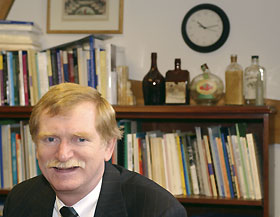|
November 17, 2003
Babor Discusses New Book
On Alcohol Policies Worldwide
Thomas Babor is professor and head of the Health
Center's Department of Community Medicine. He and 14
experts from around the world have published
Alcohol: No Ordinary Commodity, a book that
may become the standard manual for devising and
initiating alcohol policy. He was a member of the
President's Task Force on Substance Abuse, which
recently recommended new University policies on
alcohol.

|
|
Thomas Babor, head of community medicine at the
Health Center
Photo by Peter Morenus
|
He spoke recently wilth Health Center writer Pat
Keefe about the new book.
Why did you write this
book?
The World Health Organization, the premier public
health agency, was concerned about the global burden
of disease connected with the misuse of beverage
alcohol. The book is a comprehensive review of the
literature on alcohol and its effects on human
populations. It deals with the scientific basis of
the policy-making process, and how good policies can
be made with particular attention to reducing the
harm alcohol causes.
What can be done?
Two things. First, we need to recognize that alcohol
is no ordinary commodity. It is a major health risk
factor. WHO reports that of 26 major risk factors
including physical inactivity, overeating, high
cholesterol, high blood pressure, tobacco smoking,
and drug use, alcohol ranks no. 3 in the developed
countries. So it is a major risk factor for diseases,
injuries, psychiatric problems.
Second, we need to look at effective alcohol policies
supported by scientific evidence. Our book reviews
the scientific literature on 31 strategies and
interventions used around the world to prevent
alcohol problems. Interventions with the most
empirical support include alcohol taxes, drunk
driving laws, age restrictions on alcohol purchases,
and limits on physical availability of alcohol.
Isn't alcohol use an elective
behavior?
Alcohol is a commodity sanctioned by society, sold
openly, and legal for people over 21 in the U.S. The
problem is, alcohol use comes with enormous cost.
Alcohol produces intoxication, which causes
accidents, injuries, and other problems. Alcohol also
causes alcohol dependence. If you drink in excess of
the moderate guidelines - 14 drinks a week for men,
seven for women - over a long period of time, it's
possible that you'll develop a syndrome of alcohol
dependence.
What is it about alcohol that people find
so enjoyable?
Alcohol produces euphoria and cognitive stimulation.
It is a social lubricant and in some respects it has
positive health benefits, like the reduction of
coronary heart disease. Those positive effects,
though, are limited to a small segment of the
population over 40 who drink very infrequently or in
moderation.
The U.S. tried Prohibition. Does this
book recommend a new prohibition?
I think some people see any alcohol restriction as
prohibitionist. But the truth is, we already have
prohibition for people under the age of 21. We have
very strong advice against women using alcohol if
they are pregnant. What we're talking about in the
book is reasonable limitations on the use of alcohol
within certain populations at certain times and in
certain places.
Does the book prescribe more taxes and
regulation?
Taxes are a very effective means not only of limiting
alcohol consumption, but limiting alcohol problems.
Taxes generate revenues for governments, and they
affect alcoholics as much as they affect
non-alcoholics. Tax increases on alcohol affect young
people, who are prone to get intoxicated, as much as
they affect older people; yet they have little
financial impact on social drinkers and their ability
to enjoy alcohol.
Are the recommendations in the book a
combination of Prohibition and the new
Puritanism?
Not at all. When you look at alcohol policies,
sensible controls on alcohol consumption go back to
the Code of Hammurabi in ancient Babylonia more than
4,000 years ago. What we're doing is continuing that
tradition and adding to it scientific evidence
pointing to the most effective alcohol policies, like
controlling the drinking environment, training bar
and restaurant people so that they don't serve
intoxicated patrons, and introducing drinking and
driving countermeasures.
Where does industry stand on
regulation?
The alcoholic beverage industry does things that make
them appear to be good corporate citizens. We can
accept at its face value that they do support some
alcohol prevention measures. Unfortunately, they
don't pay as much attention to the scientific
evidence as they should, and they put their resources
into generally ineffective measures like alcohol
education in the schools, while they tend to oppose
increased restrictions on hours and days of sale,
alcohol advertising, drinking and driving
countermeasures, and things that are likely to have
much more beneficial effects on society.
How has the book been
received?
The reception has been very good. Our report has been
featured at national policy conferences in Australia,
Switzerland, Norway, and the UK. We've received
support from members of the scientific community who
are responsible for generating the evidence that we
hope policymakers will use. Many policy makers will
find this book a welcome addition when it comes to
passing laws, making regulations, and appropriating
funds for different treatment and prevention
programs.
| 
